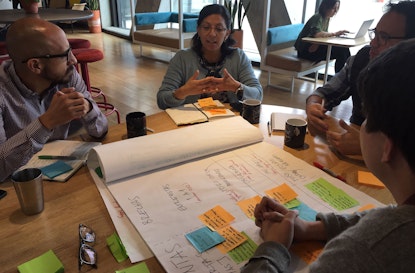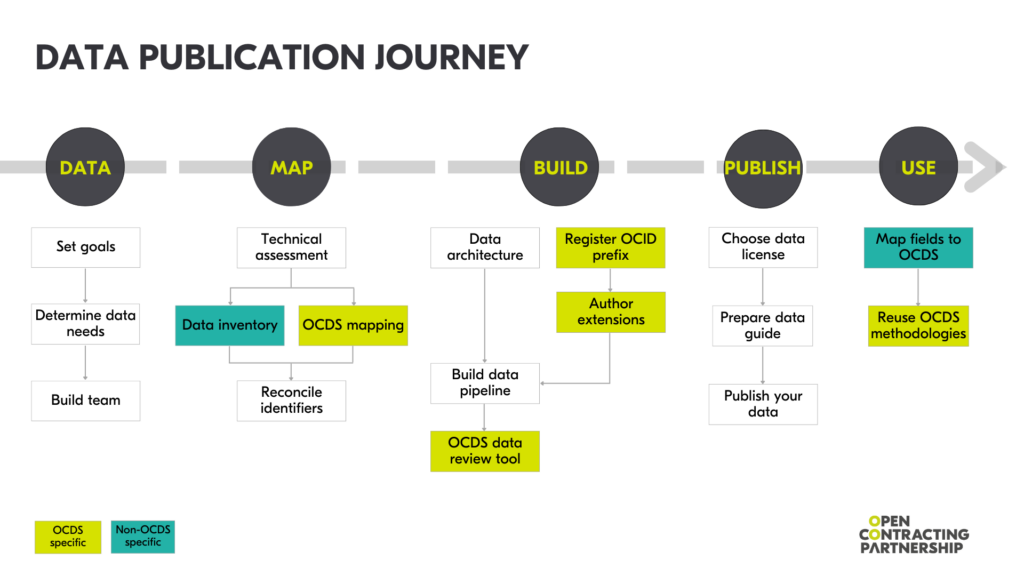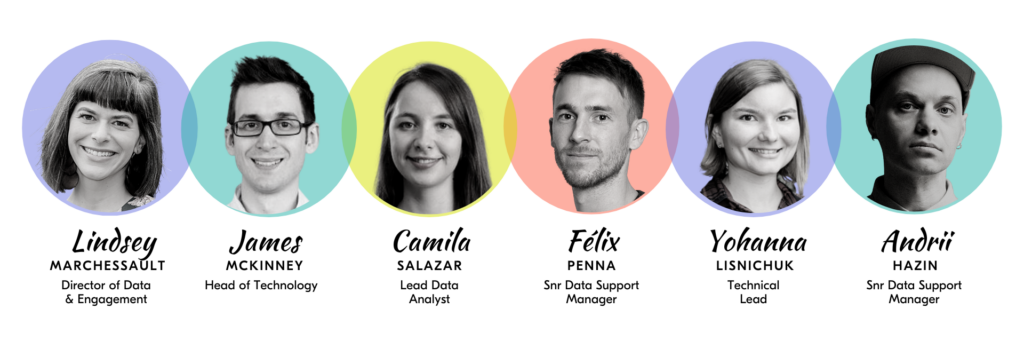5 things to know about our new support model

At OCP, our number one goal is to work with and through local partners and help reformers transform public procurement so it is open, fair, efficient and sustainable. So over the course of 2022, we took a closer look at how we organize ourselves internally to best achieve this goal (over and over again!).
1. A refreshed support model
The success of our Lift impact accelerator program has shown us that we can achieve measurable results if we prioritize our support according to clear engagement criteria, articulate a robust theory of change, and develop monitoring, evaluation and learning plans with our partners.
Building on these insights, we have developed a new support framework. In our new model we kick off our engagement with due diligence to understand the strategic goal or opportunity and the factors that will affect the likely success (political economy, data availability, capacities, resources, collaboration and inclusion). Then we focus on co-designing the support program to align with the impact goals. Since our work is all about specific results, we document baselines at the start as much as possible. As in the past, we will continue documenting the results and publishing our impact stories so that others can learn from them.
We like to see open contracting as a “gift that keeps giving,” allowing us to continue to engage with reformers and explore how we can help achieve their next impact project.
Of course, things don’t always go according to plan and we need to iterate and adapt. This iteration may require troubleshooting, fundraising, advocacy, and other changes to the support plan. We think of it as a graded support model: the more partners progress, the more we can invest. Political cycles in particular have the potential to disrupt progress and we engage with stakeholders to build resilience for political transitions to sustain reform projects.
If there are more serious problems, or changes in circumstances mean the project is no longer in line with our strategy, engagement criteria or our values, then we may deprioritize or suspend our support.
2. Putting the goals first and the Data Standard second
The OCDS remains a key tool to assist our partners, but we don’t want partners to be solely focused on “meeting a standard” — we want them to focus on achieving impactful goals.
That is why in our refreshed support model, we are putting the goals first, and then line up the data support (and advocacy and other types of support as well), using the data tools that are most appropriate to achieve the goals. We are going to leverage innovative skills, experience and ideas to advise partners on a variety of technical issues.
This means that when a partner is implementing OCDS, we will be taking their objectives into account right from the start, evaluate their capacity and their systems, and then prioritize data collection, data mapping and data modeling accordingly.

3. Supporting partners on tailored journeys toward impact
Public procurement is the government’s number one corruption risk, it’s contributing to 15% of global greenhouse gas emissions, and women-owned or small businesses from underrepresented communities are left out.
We envision a world where public procurement is accountable, digital, inclusive and sustainable and we are tailoring our support to help our partners to achieve these goals.
So in addition to this support model, we will dive deeper into several key issues such as anti-corruption, vendor inclusion, sustainability, and digital transformation.
Customizable menus of services will help partners on “implementation journeys” designed to help them achieve their goals. As we grow and scale, these journeys will be shared externally to encourage reformers guide themselves through the process.
4. Transitioning to an in-house data team
To support our refreshed support model, we have also redesigned our data support. We are transitioning from a helpdesk model working with external teams to an in-house model with an OCP data support team. The data team is now working arm-in-arm with our regional program managers to deliver data support with a focus on achieving specific goals, such as improving equity & inclusion, sustainable development, integrity, and efficiency, rather than to publish data in a particular format.
Many of our partners told us that they want to use technology to improve procurement outcomes, but also struggle with the digitization process. We are therefore stepping up our guidance and support on how to collect, structure and use data to make better decisions and to create a better user experience for procurement systems.
Up until now, we have operated a global helpdesk to support the implementation of the Open Contracting Data Standard. Since 2015, it was staffed by the amazing teams at Open Data Services Cooperative in the UK and, to focus on our growing community in Latin America, by ILDA between 2017 to 2019, and since 2019 by Paraguay-based Centro de Desarrollo Sostenible. More than 200 training sessions, more than 450 partners supported, & 30,000 hours of support logged: They have given in-depth, hands-on support to hundreds of individual partners from around the world with now more than 60 OCDS publishers. And in addition to supporting implementation, the teams have developed tools to support the Data Standard and its implementation, and helped maintain and develop the standard.
We have absolutely loved every minute of working with ODS, ILDA and CDS over the years! We are immensely grateful to their invaluable –and innumerable– contributions. We will continue explore how we can work together in the future, as well as with other digital solution organizations, as support providers to our partners around the world.
Meet OCP’s data team

We have another team member joining us in early 2023 and are planning another recruitment too.
5. Continuing to support and lift up the community
Something that is not changing? Our goal is to support and lift up our community.
Our changes are informed by what our partners and our community has been telling us. The OCDS will continue to be maintained as a global public good and developed in accordance with the needs of the global open contracting and public procurement community. We will continue to actively document our support and our results in our progress and impact stories and case studies, and continue to maintain tools and guidance for the community.
We will also continue to work with and provide financial support to partners around the world who are working to make fair, sustainable and accountable procurement a reality.
We are looking forward to continue to provide a platform for peer exchange, peer learning and community building at the local, regional and international levels.